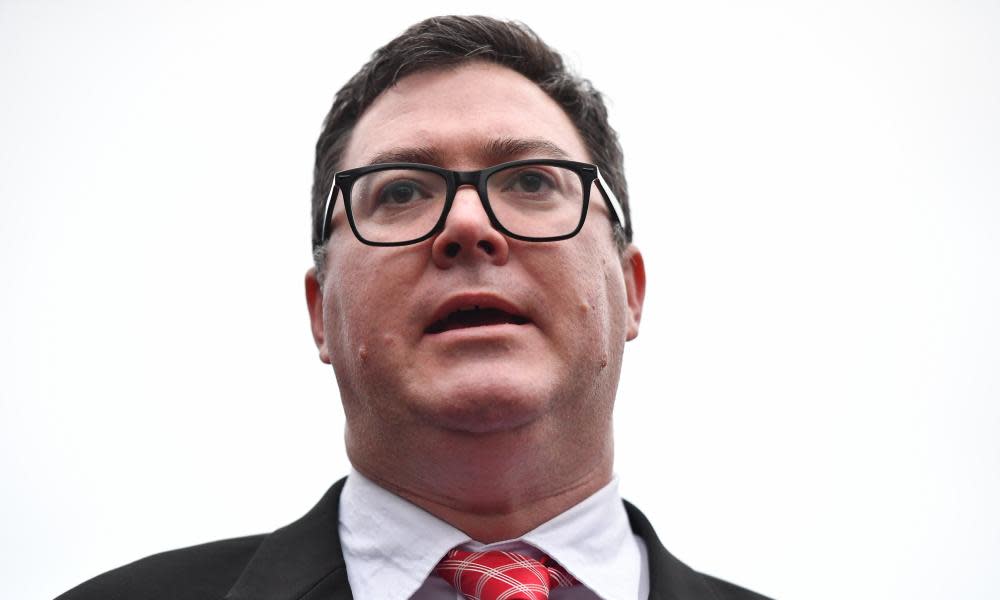George Christensen clashes with foreign investment boss who called concerns 'nationalistic'

The Morrison government needs to do a better job of explaining the benefits of foreign investment because of underlying community concerns “that foreigners are buying up the farm, they’re taking over”, a senior adviser to the government has said.
David Irvine, the former Asio spy agency chief who now heads the foreign investment review board (Firb), clashed with the outspoken Liberal National party MP George Christensen, who is chairing a trade inquiry and using it to campaign for Australia to reduce its economic dependence on China.
Irvine used his appearance before a parliamentary committee hearing on Thursday to defend the benefits of foreign investment, but when he noted that some underlying concerns were based on “nationalistic” sentiments he was accused by Christensen of being “dismissive” of community concerns.
Despite China being Australia’s largest trade partner, the picture is different when looking specifically at foreign investment.
Related: Coalition to add new national security test to Australia's foreign investment regime
Treasury officials told the hearing the top source of foreign direct investment into Australia was the United States (20.1%), followed by the United Kingdom (12.5%), Japan (11.4%), the Netherlands (5.4%) and Canada (4.6%). They said China was ranked sixth with 4.5% of the share of foreign direct investment.
Christensen asked Irvine to describe what the Australian community at large thought about foreign investment, and in particular purchases made by state-owned enterprises.
The head of Firb replied that “the starting point is probably that there is an underlying concern within the community in respect of foreign investment, that foreigners are buying up the farm, they’re taking over, it’s a nationalistic sense that our industry should be Australian – there are all those concerns and sentiments existing within the community at some point or other”.
Irvine said Firb would advise the treasurer – who makes the final decision on investment proposals that are subject to scrutiny – if there had been particular community objections so that those issues could be taken into account.
But he said one of the roles of Firb was “to provide a partial assurance to the Australian community that foreign investment proposals are being looked at closely and the national interest is being taken into consideration”.
Christensen chided Irvine for that answer, saying he was “concerned about some of the stylising that Australians are out there saying they’re against the farm being sold out and being nationalistic – it almost seems to be dismissive of those views”.
Christensen said there were “a lot of those views out there” and pressed Irvine to speculate on the result “if we did a poll of the Australian community and asked them whether they wanted foreign state-owned enterprises to be able to own Australian assets, land, companies”.
Irvine said he had been “watching criticism of various Firb decisions over a very long time” and called for facts to be at the centre of discussion.
“Five years ago when I first entered the Firb the percentage of Australian agricultural land in foreign hands was about 13%, and I think it’s currently about 13.2% or 13.3%,” Irvine told the joint standing committee on trade and investment growth.
“Maybe the response to community concerns is for the government to be doing more explaining of what those facts are and also what the benefits are of foreign involvement in Australian industry – be it agriculture or whatever – because there’s no doubt that it brings benefit.”
Irvine later added that it was not just government but the Firb that “should be doing a little more to demonstrate the benefit to the Australian economy and community of foreign investment”.
He said one in 10 Australian jobs was dependent on foreign investment, while the average wage of an Australian employed by a foreign company was about $20,000 higher than the average wage paid by domestic companies.
Irvine resisted attempts to make sweeping statements about Australian concerns about the actions of government-owned investors when pressed by Christensen.
“With the greatest respect it depends what sort of state-owned enterprise investment you’re talking about and where it comes from,” Irvine said.
“If it’s the Ontario Teachers Pension Fund, which is a state-owned enterprise for the purposes of our act, may be very different from the investment of a state-owned enterprise of an authoritarian country.”
The government announced in June that it would add a new national security test to Australia’s foreign investment regime, including powers for the treasurer to vary the conditions of an acquisition by an overseas buyer, or dispose of the investment if security risks emerge post-approval.
The legislation is expected to be introduced to parliament shortly.
Roxanne Kelley, a Treasury deputy secretary, said Australia welcomed foreign investment “for the significant benefits it provides but we need to ensure investments are not contrary to the national interest, including national security”.
Asked what had prompted the reforms, Irvine said there had been significant changes in “the investment environment”. One example he gave was that state and territory governments were increasingly divesting themselves of critical infrastructure.
Irvine confirmed that the long-term lease of the Port of Darwin to a Chinese company on a 99-year lease in 2015 had not been subject to Firb review because of the laws that were in place at the time, but that had already prompted the government to make earlier changes requiring such proposals to be considered.


